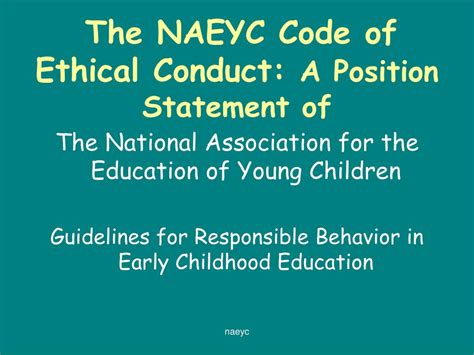The National Association for the Education of Young Children (NAEYC) Code of Ethical Conduct is a foundational document that outlines the ethical principles and responsibilities of early childhood professionals. As a professional in the field of early childhood education, it is essential to understand and adhere to this code, which serves as a guide for making decisions and taking actions that promote the well-being and development of young children. The NAEYC Code of Ethical Conduct is based on the core values of respect, responsibility, and relationships, and it provides a framework for professionals to reflect on their practices and make informed decisions that prioritize the needs and interests of children.
Core Values and Principles

The NAEYC Code of Ethical Conduct is built on four core values: respect, responsibility, justice, and compassion. These values are interrelated and inform the principles and standards that guide the work of early childhood professionals. The code emphasizes the importance of respecting the dignity and worth of each child, family, and colleague, and of taking responsibility for one’s actions and their impact on others. It also highlights the need to promote justice and fairness in all aspects of early childhood education, and to approach one’s work with compassion and empathy.
Respect and Relationships
The NAEYC Code of Ethical Conduct emphasizes the importance of building and maintaining respectful relationships with children, families, and colleagues. This includes recognizing and valuing the diversity of children’s experiences, cultures, and backgrounds, and creating inclusive and welcoming environments that support the development of all children. Early childhood professionals are also expected to communicate effectively and honestly with families, and to involve them in decision-making processes that affect their children’s education and care.
| Core Value | Principle |
|---|---|
| Respect | Recognize and value the dignity and worth of each child, family, and colleague |
| Responsibility | Take responsibility for one's actions and their impact on others |
| Justice | Promote justice and fairness in all aspects of early childhood education |
| Compassion | Approach one's work with compassion and empathy |

Key Points

Key Points
- The NAEYC Code of Ethical Conduct is a foundational document that outlines the ethical principles and responsibilities of early childhood professionals
- The code is built on four core values: respect, responsibility, justice, and compassion
- Early childhood professionals are expected to respect the dignity and worth of each child, family, and colleague, and to take responsibility for their actions and their impact on others
- The code emphasizes the importance of building and maintaining respectful relationships with children, families, and colleagues
- Early childhood professionals are expected to communicate effectively and honestly with families, and to involve them in decision-making processes that affect their children’s education and care
Implications for Practice
The NAEYC Code of Ethical Conduct has significant implications for the practice of early childhood professionals. By adhering to this code, professionals can create high-quality early childhood programs that support the development and well-being of all children. This includes recognizing and valuing the diversity of children’s experiences, cultures, and backgrounds, and creating inclusive and welcoming environments that support the development of all children. It also involves communicating effectively and honestly with families, and involving them in decision-making processes that affect their children’s education and care.
Challenges and Opportunities
Implementing the NAEYC Code of Ethical Conduct can present challenges for early childhood professionals, particularly in contexts where resources are limited or where there are conflicting values and priorities. However, it also presents opportunities for professionals to reflect on their practices, to identify areas for improvement, and to develop new skills and strategies that support the development and well-being of all children. By embracing the principles and values of the code, professionals can create high-quality early childhood programs that promote the development and well-being of all children, and that support the development of a more just and equitable society.
What is the purpose of the NAEYC Code of Ethical Conduct?
+The NAEYC Code of Ethical Conduct is a foundational document that outlines the ethical principles and responsibilities of early childhood professionals. Its purpose is to provide a framework for professionals to reflect on their practices and make informed decisions that prioritize the needs and interests of children.
What are the core values of the NAEYC Code of Ethical Conduct?
+The NAEYC Code of Ethical Conduct is built on four core values: respect, responsibility, justice, and compassion. These values are interrelated and inform the principles and standards that guide the work of early childhood professionals.
How can early childhood professionals implement the NAEYC Code of Ethical Conduct in their practice?
+Early childhood professionals can implement the NAEYC Code of Ethical Conduct by recognizing and valuing the diversity of children's experiences, cultures, and backgrounds, and creating inclusive and welcoming environments that support the development of all children. They can also communicate effectively and honestly with families, and involve them in decision-making processes that affect their children's education and care.
In conclusion, the NAEYC Code of Ethical Conduct is a critical document that outlines the ethical principles and responsibilities of early childhood professionals. By embracing this code and incorporating its principles into their practice, professionals can create high-quality early childhood programs that support the development and well-being of all children. As the field of early childhood education continues to evolve, it is essential that professionals remain committed to the values and principles of the NAEYC Code of Ethical Conduct, and that they continue to reflect on their practices and make informed decisions that prioritize the needs and interests of children.



